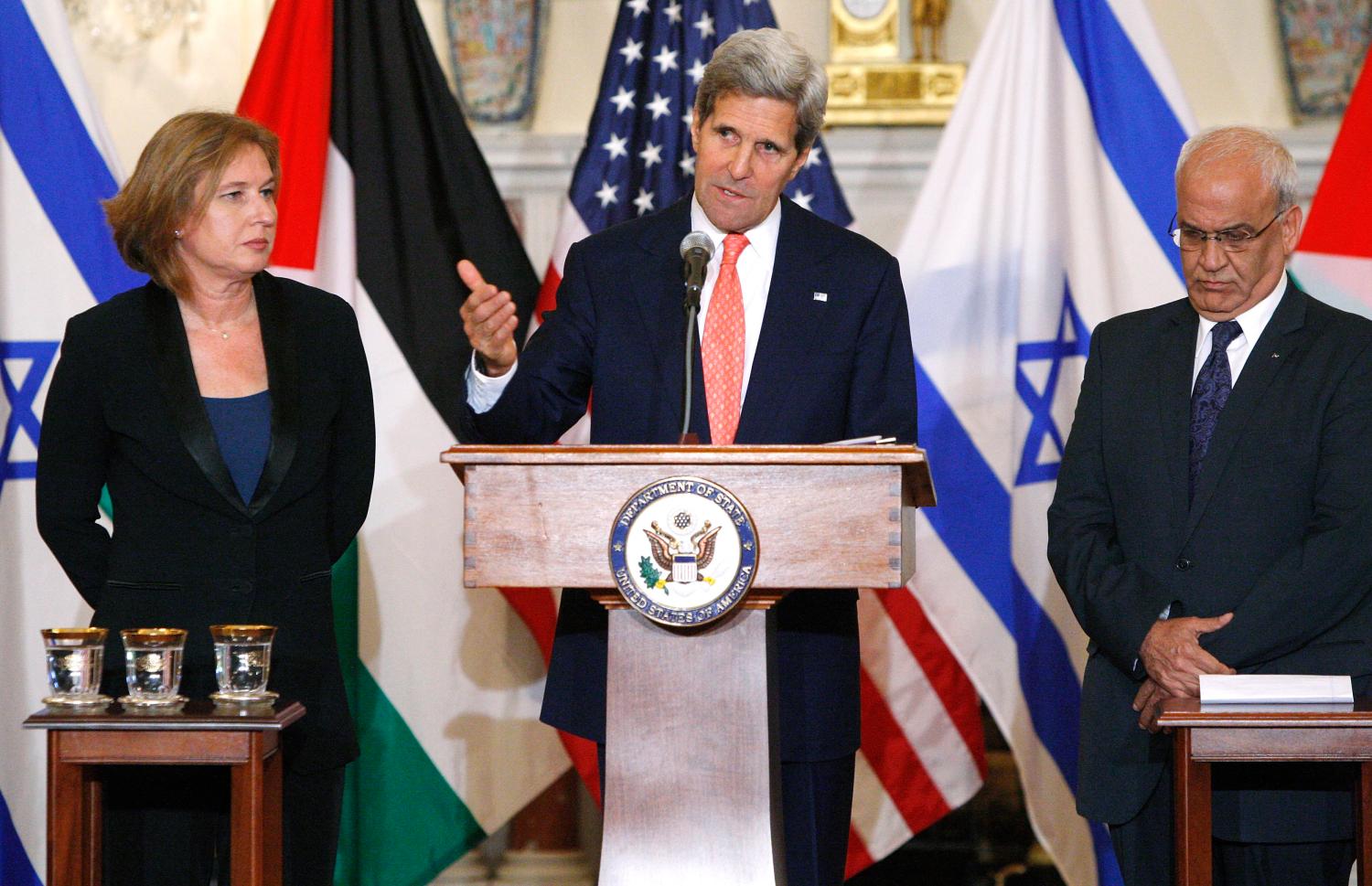Should Palestinian-Israeli peace negotiations fail, Natan Sachs writes that there is a risk of full-blown violence between the parties, coupled by terrorism from Lebanon and the Sinai Peninsula. To prepare, the United States should candidly assess the risk of violence and how to stem it should it erupt, and re-energize U.S. involvement in daily security coordination.
 |
MEMORANDUM TO: President Obama |
Summary and Recommendations
The current peace negotiations between the Israelis and Palestinians offer a glimmer of hope for resolving the longstanding conflict between the parties. But even as the United States works diligently to ensure the success of the talks, we should start the difficult and discreet task of preparing for their possible failure.
Failure of the talks carries a real risk—low probability but high impact—of full-blown violence between the parties. Such violence would be reminiscent of the aftermath of the Camp David negotiations in summer 2000, but it would be greatly complicated by recent upheavals in the Middle East and could spiral into a wider campaign against Israel from unstable regions in Syria and in the Sinai Peninsula. A breakout of regional violence of this kind would have profound and lasting consequences for future resolution of the Israeli-Palestinian conflict, which you determined last year to be a
U.S. priority in the Middle East.
Even as Secretary Kerry and Special Envoy Martin Indyk focus their energy on the goal of a final settlement, you should candidly assess the possibility of the collapse of the talks into regional violence. Should you identify signs of a major outbreak of violence, U.S. policy should change rapidly. Instead of continuing to prioritize diplomatic progress amidst violence, as the United States did in the first few months of the Second Intifada in late 2000 and early 2001, the administration should suspend peace negotiations and focus on robust engagement with the Palestinian Authority (PA), Egypt and other regional actors, clamping down quickly and decisively on any acts of terrorism.
We should support Israel publically in fighting repeated terrorism. U.S. intelligence efforts with regard to jihadist activity toward Israel should be prioritized, in collaboration with the Israelis. At the same time, we will want to encourage Israel to continue prioritizing strategic interests, such as its peace treaty with Egypt or its neutrality in the Syrian civil war, even while facing severe short-term dangers.
Background
In the run-up to the failed Camp David summit in 2000, both Palestinians and Israelis were preparing for potential clashes in case the talks failed. Violence soon broke out, following a visit to Temple Mount by Israeli opposition leader Arial Sharon. Pre-existing networks of Fatah activists, loose affiliations from across different Palestinian factions and even armed personnel from PA security organizations soon engaged in a wave of violence against civilians inside Israel not seen since 1949. Israeli forces, anticipating such an outbreak, prepared a forceful response that may have exacerbated the situation.
While disappointment with the outcome of Camp David may have contributed to the violence, the organization of the militants suggests that wider interests were at play. In particular, the Palestinian leadership—from Fatah, Hamas and smaller organizations alike—inflamed the crisis rather than seeking to calm it, each for its own reasons.
The situation today is considerably different. The PA security forces have been reformed, thanks in part to close U.S. involvement. Palestinian leader Mahmoud Abbas is much less likely than his predecessor, Yasser Arafat, to endorse terrorism against Israeli civilians. That said, Abbas and Fatah do not control the Gaza Strip. In Gaza, Hamas finds itself in dire straits, particularly since the fall of the Muslim Brotherhood-led government in neighboring Egypt. Hamas, or elements within it, may decide that outright violence would offer a path out of isolation and back into the mainstream of Palestinian and regional Arab politics.
Fatah, as well, suffers from a crisis of strategy. Should the negotiations fail, there may be those in Fatah who would opt to disrupt the status quo in hopes of re-positioning their faction—in Palestinian public perception—away from a failed peace process. With no apparent successor to Abbas, would-be contenders for the leadership of Fatah may likewise hope to seize an opportunity to distinguish themselves through “resistance” to Israel.
Moreover, much has changed in Israel’s surroundings since 2000. To the north, the Lebanese Hezbollah is now heavily engaged in the civil war in Syria, leaving it severely exposed in Lebanon. Therefore, it is less likely to seek a confrontation with Israel than in the past. However, opponents of Hezbollah and of the Assad regime in Syria, particularly among Sunni radicals in Syria or Palestinian groups in Lebanon, may seek to draw Israel into a confrontation with their enemies by provoking Israel into incursions into Lebanese and Syrian territory. We have already seen first signs of such attempts in December 2013. Moreover, jihadists may also attempt to operate from the West Bank, where networks of jihadists have recently been uncovered.
In the Sinai Peninsula, to Israel’s south, security and the rule of law have dramatically deteriorated since 2000. Despite recent spirited attempts by the Egyptian armed forces to regain control of the area, foreign jihadists and armed local groups pose a considerable threat to Israel, including to the civilian air route to the southern city of Eilat. Should confrontation erupt between Israel and the Gaza Strip, Gaza- and Sinai-based groups may well step up their existing attempts to provoke Israel into a response across the Egyptian border, which, in turn, could damage the strategically important relations between Israel and Egypt.
If signs of PA-tolerated violence appear, we will want to suspend negotiations and instead engage immediately and robustly with our partners in the region to try to stem a breakdown of order. Although events will be largely outside U.S. control, the United States still has important diplomatic and financial leverage to bring to bear. Avoiding a full-blown “Third Intifada”—or worse, an intifada mixed with widespread regional terrorism—would justify expending considerable diplomatic capital.
To prepare for such an eventuality, it is important that you re-energize U.S. involvement in security coordination between the parties today, under the auspices of the Security Coordinator for Israel and the Palestinian Authority at the State Department. Security cooperation today is good, but it may deteriorate rapidly if circumstances change. Immediately enhancing the U.S. profile by widening the role of the Security Coordinator, alongside that of General John Allen, the security advisor to the peace negotiations, may help mitigate the effects of such deterioration.
The administration should also attempt to strengthen ties to parts of Fatah outside the official security establishment of the PA in order to ensure they do not destabilize the situation on their own. Coordinating with our allies, we should make clear that any move toward violence would hinder rather than promote Palestinian interests in international arenas. All parties in the region must understand the diplomatic and material costs they would incur if they are complicit in a resumption of violence.
Finally, with the change in leadership in Egypt, it is also important to ensure viable diplomatic means for coordinating a cease fire with Hamas, via Turkey, Qatar and other regional actors, should a ceasefire be necessary.
Conclusion
The “Second Intifada,” which began in 2000, scarred a generation of Israelis and Palestinians, and left the Israeli public deeply mistrusting of Palestinian intentions. A recurrence of such violence, especially if coupled with regional violence in the new and volatile Middle East, could cement the mutual distrust for many more years to come. In other words, violence, more than just the failure of negotiations, might be the key to fulfilling Secretary Kerry’s warning that the two-state solution could soon be unattainable.
Given the costs to U.S. interests of a severe outbreak of violence, it is important that the negotiations be coupled with preparations for a worst-case outcome.



